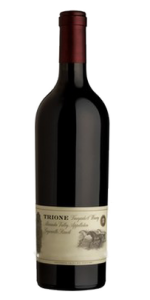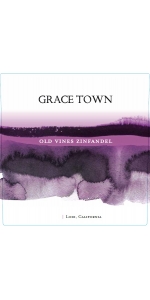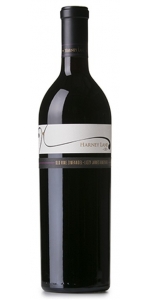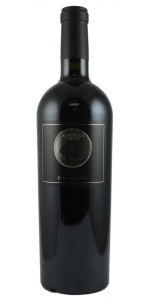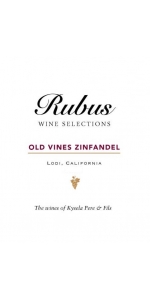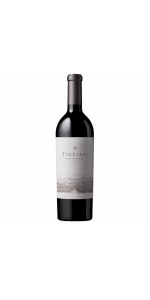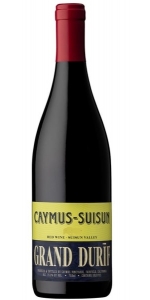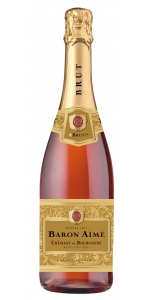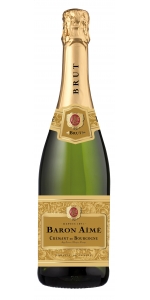Ridge Zinfandel Guadagni 2018
| Country: | United States |
| Regions: | California California (Sonoma County) |
| Winery: | Ridge Vineyards |
| Grape Type: | Zinfandel |
| Organic: | Yes |
| Vintage: | 2018 |
| Bottle Size: | 750 ml |
Trione Zinfandel Flatridge Ranch is made from 100 percent Zinfandel.
Aromas of briarwood and pipe tobacco give way to blackberry pie, toasted macaroons and plums. The wine is velvety, supple and rich with a long, satisfying finish. This Zinfandel, a Sonoma County classic, will continue to age for many years to come.
Flatridge Ranch is a secluded parcel in the Coastal mountain range, west of the Rockpile AVA. Here the Trione family planted a 10 acre vineyard in 2008. The vines are a unique Zinfandel selection called Saint Peter’s Church, whose provenance is a 100-year-old block in Cloverdale, a small town north of our Geyserville winery. The 2013 vintage was a perfect growing season.
Cases produced: 575
Winemaking: We fermented the grapes in small, open top fermenters, hand plunging the cap three-four times daily. The wine aged 18 months in American oak barrels, 40% new.
Grace Town Old Vine Zinfandel Lodi is amde from 98% Old VIne Zinfandel + 2% Cabernet Sauvignon.
Ruby red in color, with red fruit, raspberry, and spice on the nose. This wine is medium in body, with notes of ripe cherry, cedar box, cinnamon, anise, black pepper, and hint of smoke on the palate. It has a long, silky finish.
Harney Lane Old Vine Zinfandel Lizzy James Vineyard is made from 100 percent Zinfandel.
Unabashedly ripe, but keeping true to it’s vineyard driven Zinfandel fruit notes of dark morello cherry, blackberry and pomegranate jelly. This full-bodied wine is deep with concentration, supple and polished with a careful measure of sweet oak that supports the generous fruit flavors.
Lizzy James Vineyard is registered as a Historical Vineyard by the Historical Vineyard Society; The vineyard name is the middle names of our children which were given to them in honor of grandparents.
Sub-appellation : Mokelumne River
T.A. : 6.5 g/L
pH : 3.8
R.S. : 0.4 %
Kinsella Estates Spencer Zinfandel is made from 100 percent Zinfandel.
A complex amalgamation of tart blueberries, baked plums, warm earth, fresh black cherries, anise, pie crust, brown sugar and a slight note of sweet confectionary candy. On the palate, the wine is plush with great depth and an expansive roundness that seems to push outward with power. The complex flavor mirrors the nose, with a savory/spicy finish and a slightly sticky/resinous grip of the tannins.
SALE!
Lodi, American Viticulture Area (AVA) – The Lodi AVA is located in the northern end of the San Joaquin Valley, Central Valley California, east of the San Francisco Bay. Lodi has warm days and cool nights, similar to the Mediterranean climate. The lower temperatures that occur in Lodi result in fruit with good acidity. A wide range of soils are found in the Lodi AVA, but they generally are deep, loamy, sandy, rocky soils similar to that found in southern Rhone valley.
The Lodi appellation totals almost one half million acres, and the approximately eight hundred growers farm roughly 90,000 acres. Lodi produces more Cabernet Sauvignon, Chardonnay, Merlot, Sauvignon Blanc, and Zinfandel than any other wine region in California, but it is probably best known for its old vine Zinfandel. The vines are often head trained giving them a classic old world appearance.
Zinfandel – The Zinfandel grape is a hearty variety that produces grapes with high sugar levels, often resulting in wines with a high alcohol content. Thought to be a relative of Primitivo that is found in southeast of Italy (the boot heel), Zinfandel can be made into a wide range of wine styles, including White Zinfandel, light or full bodied red wines, and even late harvest desert style wine. However Zinfandel, especially Old Vine Zinfandel from Lodi, is usually made into a full bodied, spicy red wine with characteristics of red fruit, raspberry, and cherry.
Produced in the heart of Lodi AVA.
Rubus Zinfandel Lodi is made from 98% Zinfandel + 2% Cabernet Sauvignon
Bottled after aging in French and American oak for 9 months.
Rubus Zinfandel Lodi presents with ruby red in color, with red fruit, raspberry, and spice on the nose. This wine is medium in body, with notes of ripe cherry, cedar box, cinnamon, anise, black pepper, and hint of smoke on the palate. It has a long, silky finish.
Selected by Fran Kysela MS.
When the founding fathers of the Napa Valley carved out new sub-AVAs (American Viticultural Areas) in the 1980s, Soda Canyon Ranch was not yet on anyone’s map. The vineyard is neighbored to the northwest and west by the winegrowing districts of Stags Leap District and Oak Knoll District, respectively, which were among the early pioneers of California Cabernet Sauvignon to attain global fame. To the northeast and southeast—and further off the beaten path—were Atlas Peak and Coombsville, thought to be the next frontiers for the emerging wine-producing region.
With richness and depth of flavor, the 2018 Timeless Napa Valley is the embodiment of patience and attention to detail. Decades of experience at Soda Canyon Ranch allow winemaker Nate Weis and team to highlight the individual merits of each block. Combining the strongest lots from each resulted in a refined and harmonious bottling.
In 2018, the diurnal shift at Soda Canyon Ranch produced a darker, lusher fruit profile of Cabernet Sauvignon. Simultaneously, the overnight recovery periods resulted in expressive and refined Merlot, giving the wine a pleasant profile of bright, red fruit. With an extended harvest window, the signature, plush density and structure of Petit Verdot is also prevalent in the final blend. Cabernet Franc thrived in 2018 with its predilection for the cooler soils and the climate of blocks 5, 6, 16, 20 and 21—areas we call the Transition Zone and Hardpan Alley. The variety’s floral and tobacco-like aromatics are accentuated, and its more aggressive nature for back-end tannins tamed.
Once blended, the 2018 vintage rested in French oak barrels for 16 months, developing flavors of vanilla and baking spice. Velvety tannins dance across the palate of bright and lingering cassis. With a smooth finish, this is a comforting wine of elegance and depth—a sophisticated expression of the sedate summer.
Review:
This is a little old-school and shows lots of dark berry, chocolate and dried fruit. It’s full, dense and layered with fleshly sensibility. Velvety texture.
-James Suckling 93 Points
Ridge Zinfandel Guadagni is made from 80% Zinfandel, 20% Petite Sirah.
Jammy nose of blackberry and cassis with notes of pepper, mint and tobacco. Full-bodied on the palate with well coated tannins, black cherry fruit and a long, layered finish.
Owned and farmed by the Guadagni family for over fifty years, this vineyard grows in the rocky soils at the northern edge of the Dry Creek Valley. Planted primarily to zinfandel; petite sirah from an adjacent parcel was added this year for color and depth. We limited pump-overs to once daily and pressed after eight days of fermentation as color and tannin were plentiful.
In 1962, Ridge made its first Monte Bello, and two years later its first zinfandel. Since that time, Ridge has championed single-vineyard winemaking, searching California for those rare and exceptional vineyards where climate, soil, and variety are ideally matched.
Ridge Vineyards: Property in the 1800’s
The history of Ridge Vineyards begins in 1885, when Osea Perrone, a doctor who became a prominent member of San Francisco’s Italian community, bought 180 acres near the top of Monte Bello Ridge. He terraced the slopes and planted vineyards; using native limestone, he constructed the Monte Bello Winery, producing the first vintage under that name in 1892. This unique cellar, built into the mountainside on three levels, is Ridge’s production facility. At 2600′, it is surrounded by the “upper vineyard”, now referred to as the Perrone Ranch.
The 1940’s: Restart of the Winery
In the 1940s, William Short, a theologian, bought the abandoned winery and vineyard just below the Perrone property; he replanted several parcels to cabernet sauvignon in the late 1940s. From these vines — now the “middle vineyard” and referred to as the Torre Ranch — new owners Dave Bennion, Hew Crane, Charlie Rosen, and Howard Ziedler, all Stanford Research Institute engineers, made a quarter-barrel of “estate” cabernet. That Monte Bello Cabernet was among California’s finest wines of the era. Its quality and distinctive character, and the wines produced from these same vines in 1960 and ’61, convinced the partners to re-bond the winery in time for the 1962 vintage. Dave Bennion left his role at S.R.I. to oversee winemaking duties full time.
The Zinfandel Introduction
The first zinfandel was made in 1964, from a small nineteenth-century vineyard farther down the ridge. This was followed in 1966 by the first Geyserville zinfandel. The founding families reclaimed the Monte Bello terraces, increasing vineyard size from fifteen to forty-five acres. Working on weekends, they made wines of regional character and unprecedented intensity.
A New Era of Winemaking
By 1968, production had increased to just under three thousand cases per year, and in 1969, Paul Draper joined the partnership. A Stanford graduate in philosophy—recently returned from setting up a winery in Chile’s coast range—he was a practical winemaker, not an enologist. His knowledge of fine wines and traditional methods complemented the straightforward “hands off” approach pioneered at Ridge. Under his guidance the old Perrone winery (acquired the previous year) was restored, the finest vineyard lands leased or purchased, the consistent quality and international reputation of the wines established. Cabernet and Zinfandel account for most of the production; Syrah, Grenache, Carignane, and Petite Sirah constitute a small percentage. Known primarily for its red wines, Ridge has also made limited amounts of chardonnay since 1962.
Recent History and Expansion of Operations
Lytton Springs, in Sonoma County, became part of the Ridge estate in 1991. A quarter century’s experience with this vineyard had convinced us that it was an exceptional piece of ground. Forty consecutive vintages of Geyserville attest to yet another stunning combination of location and varietals. Though born in the early sixties to the post-Prohibition world of modern California winemaking, Ridge relies on nature and tradition rather than technology. Our pre-industrial approach is straightforward: find intense, flavorful grapes; intrude upon the process only when necessary; draw the fruit’s distinctive character and richness into the wine.
Caymus Suisan Grand Durif is made from 100 percent Caymus Suisan Grand Durif.
Only 30 minutes from Napa, Suisun Valley (which became an AVA in 1982) is still largely undiscovered. With its warm days and cool nights, this pastoral region reminds us of Napa Valley in the 1960s. Known for delicious stone fruits and walnuts, it is also gaining recognition for exceptional wine. Durif is synonymous with Petite Sirah, the widely grown grape in the region – we added “Grand” to the name for its grand style. With harmonious tannins, this wine is opulent, luxuriously soft and totally enjoyable.
Baron Aime Cremant de Bourgogne Brut Rose NV is made from 85% Pinot Noir & 15% Chardonnay.
Light pink color with coppery shades. The citrus notes blend subtly with aromas of strawberry, forming a fresh and delicate bouquet. The palate is lively, with notes of grapefruit and fresh bread. Together they form a rich, fresh and vibrant wine.
Review:
"Steely amber color. Aromas and flavors of strawberry, green apple, toasted oats, and creme fraiche with a satiny, lively, finely carbonated, dry light-to-medium body and a tingling, intricate, medium-length finish that presents overtones of slightly under ripe wild strawberries, apricot, warm bread dough, and lemon zest. Lively and bright for a perfect apéritif yet with just enough richness and body to carry you in seamlessly to the first course."
- Beverage Testing Institute (November 2022), 94 pts - GOLD MEDAL - BEST BUY
Baron Aime Cremant de Bourgogne Brut is made from 40% Chardonnay, 30% Pinot Noir, 30% Aligote.
Light yellow with bright reflections. The nose is fresh and lemony with subtle floral aromas, apple and citrus fruits. The mouth is fresh, delicate, tight and precise with fine bubbles that stimulate the palate nicely.
A delicious aperitif and a great match with shellfish.
Review:
Golden straw color. Aromas and flavors of brioche, green and yellow apple, dried pineapple, and lemon oil with a supple, vibrant, finely carbonated, dry medium body and a smooth, engaging, medium-long finish displaying impressions of croissant with salted butter and tart pear jam, white tea, and grapefruit peel with no oak flavor. A lovely and racy apéritif that will pair splendidly with a cheese and bread course."
- Beverage Testing Institute 93 pts - GOLD MEDAL - BEST BUY
- back
Boekenhoutskloof Syrah Swartland is made from 100 percent Syrah.
Grapes for our Boekenhoutskloof Syrah are picked from selected parcels of the finest Syrah, grown at our Swartland farms, namely Porseleinberg and Goldmine, close to the small town of Riebeek-Kasteel. These vineyards were planted on the rocky bedrock of decomposed Mica-Schist, a unique terroir, finding its expression in our concentrated and structured wines made from this Rhône grape.
The nose is perfumed, forthcoming and fresh, offering an array of rich dark fruits with a spicy, floral, even feral character, derived from complex aromas of dark berries, plums, violets, black olives, star anise and potting soil. The black fruits and earthy character of the nose follow through onto a dark, brooding palate with flavours of wild berries, brambles, liquorice, tobacco, cloves and black cardamom. The mid-palate is concentrated, deep, dense and slightly dusty, with dry, very fine cocoa-powdery tannins lending structure. The wine is very precise, with a medium to full body, a tight, grainy texture and vibrant acidity to balance. Blackberries, blueberries and notes of garrigue and dark chocolate linger on a savoury finish.
Review:
Using fruit from two exceptional Swartland sources – Goldmine and mostly Porseleinberg – this foudre-aged Syrah is fresh, subtle and intensely aromatic, as schist Syrahs often tend to be. Complex, floral and refined with remarkable freshness and palate length. Drink: 2020-2028.
– Tim Atkin MW, 95/100
Morlet Family Vineyards Mon Chevalier Cabernet Sauvignon is made from Cabernet Sauvignon (86%) Cabernet Franc (8%) Merlot (3%) Malbec (2%) Petit Verdot (1%) .
Located on the hillsides of Knights Valley, near Calistoga, this vineyard benefits from its proximity to Mount St. Helena, whose warm and windy climate is ideal for the long ripening of the Bordeaux red varietals. Handcrafted by using classical winemaking techniques, this special wine is dedicated to our son, Paul Morlet.
Dark red with a hue of purple. Intense and complex bouquet of red, black and blue berries intermixed with notes of blueberries, minerals (graphite, wet river rocks) licorice, fresh blond tobacco and a hint of lavender. Full bodied, the palate is reminiscent of the nose, with a richly tannic yet round frame and a great intensity. The hillside tannins and the classical aromatic complexity create a harmonious ensemble, leading to a very long and elegant finish. Built to age for decades, this collectible wine opens up after a few years of cellaring and is particularly representative of this special vineyard from the hillside of Knights Valley. Mon Chevalier features the interaction of the loamy, well drained and rocky volcanic soil, the typical sunny mountain climate and the low-interventionistic Morlet winemaking approach.
Property Name: Mon Chevalier
Name Meaning My Knight Named after our son, Paul Morlet
Type of wine Vineyard designated
Appellation Knights Valley
Vineyard singularity Morlet Family Estate Hillside 1100-1200 feet elevation Rhyolitic, loam & volcanic ash
Typical harvest date End of October
Picking Manual, small lugs, refer truck
Sorting Cluster by cluster, berry per berry
Fermentation Through native yeast Tank and Puncheons
Upbringing 16 months French oak from artisan coopers
Bottling Unfiltered
Cellaring time Decades
Serving Room temperature
Decanting recommended
Review:
The 2018 Cabernet Sauvignon Mon Chevalier comes from the Knights Valley, just north of Napa Valley in the larger Sonoma County, and it always seems to me to have one foot in Napa and one foot in Sonoma. Boasting a similar ruby/purple color (as do all of the releases here), it’s slightly more reserved and stately (knightly, if you will), with building aromas and flavors of blackcurrants, toasted bread, dried violets, baking spices, and loamy earth. These carry to a pure, full-bodied, multi-dimensional Cabernet that’s flawlessly balanced, has ripe yet certainly present tannins, a notable sense of minerality, and a great, great finish. It’s just another incredible wine from Luc Morlet that can be drunk today with ample pleasure or cellared for 20-30 years if, for some reason, you feel the need to delay gratification.
-Jeb Dunnuck 99 Points


